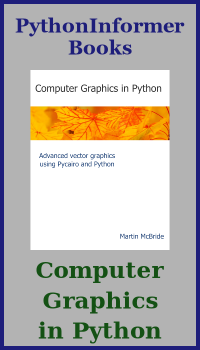generativepy.shape2d module
Categories: generativepy generative art

The shape2d module provide support for abstract shapes.
The module provides a Points object that stores a list of points that can be used to represent a polygon. The list of points that can be manipulated before being drawn.
The module doesn't have any drawing capability of its own, but a Points object can be passed into a Polygon object's of_points method to draw the polygon.
A Points object can be created from a list of coordinates, or via static methods. Currently there is one stati method, to create a regaular polygon.
Future versions of this class will contain other methods for manipulating shapes.
Points
A Points object is a wrapper around a list of Vector objects that each represent one vertex of a polygon.
Points objects are immutable.
staticmethod regular_polygon
Returns a Points object representing a regular polygon
regular_polygon(sides, centre=(0, 0), radius=1, flat_base=True)
| Parameter | Type | Description |
|---|---|---|
| sides | int | Number of sides of polygon, must be 3 or greater |
| centre | (Number, Number) | Centre of polygon, default (0, 0) |
| radius | Number | Outer radius of polygon, default 1 |
| flat_base | Bool | True (default) for flat base |
Create a Points object representing a regular polygon.
sides is the number of sides - 3 for an equilateral triangle, 4 for a square, etc.
centre is the centre of the polygon.
The radius is the radius of a circle that tightly encloses the polygon.
If flat_base is true the points will be arranged so that the polygon base is horizontal. If it is false the points will be arranged so that the first vertex is on the x-axis.
To obtain other orientations, use the rotate method.
Constructor
Creates a Points object.
Points(points)
Vector(seq)
| Parameter | Type | Description |
|---|---|---|
| points | iterable of (Number, Number) items | Points of shape |
points is a iterable containing a list of point values. It can be a list, a tuple, another Points object, or any other iterable with at least 3 values.
Each value within the points parameter must be a sequence of two numbers. It can be a list, a tuple, a Vector or similar.
transform
transform(m)
| Parameter | Type | Description |
|---|---|---|
| m | Matrix |
Creates a Points that is the result of multiplying every point is this Points object by m.
scale
scale(scale_x, scale_y=None)
| Parameter | Type | Description |
|---|---|---|
| scale_x | Number | Scaling factor in x-direction |
| scale_y | Number | Scaling factor in y-direction |
Creates a Points that is the result of scaling every point is this Points object by scale_x in the x-direction and scale_y in the y-direction.
If scale_y is None, the points will be scaled by scale_x in both directions.
translate
translate(x, y)
| Parameter | Type | Description |
|---|---|---|
| x | Number | x distance |
| y | Number | y distance |
Creates a Points that is the result of translating every point is this Points object by (x, y).
rotate
rotate(angle)
| Parameter | Type | Description |
|---|---|---|
| angle | Number | Angle in radians |
Creates a Points that is the result of rotating every point is this Points object by angle radians counterclockwise about the origin.
Standard operators
The Vector class supports a number of operators and built-in functions.
Variables used inn the examples:
mia aMatrixobjects.pis aPointsobject.nis a number (int or float).
Operator examples:
m * p # Multiply matrix by points object (is transfrom the object using m).
u == v # Test for equality, uses the `is_close` function on each corresponding pair of elements.
u[n] # nth element of u. n must be an integer between 0 and 1 inclusive.
Built-in function examples:
len(p) # Number of elements in p
iter(p) # Return an iterator that iterates over the values in p then stops.
str(p) # String representation of p
Related articles
- generativepy.analytics module
- generativepy.bitmap module
- generativepy.color module
- generativepy.drawing module
- generativepy.drawing3d module
- generativepy.formulas module
- generativepy.geometry module
- generativepy.geometry3d module
- generativepy.gif module
- generativepy.graph module
- generativepy.math module
- generativepy.movie module
- generativepy.nparray module
- generativepy.table module
- generativepy.tween module
- generativepy.utils module
Join the GraphicMaths/PythonInformer Newsletter
Sign up using this form to receive an email when new content is added to the graphpicmaths or pythoninformer websites:

Popular tags
2d arrays abstract data type and angle animation arc array arrays bar chart bar style behavioural pattern bezier curve built-in function callable object chain circle classes close closure cmyk colour combinations comparison operator context context manager conversion count creational pattern data science data types decorator design pattern device space dictionary drawing duck typing efficiency ellipse else encryption enumerate fill filter for loop formula function function composition function plot functools game development generativepy tutorial generator geometry gif global variable greyscale higher order function hsl html image image processing imagesurface immutable object in operator index inner function input installing integer iter iterable iterator itertools join l system lambda function latex len lerp line line plot line style linear gradient linspace list list comprehension logical operator lru_cache magic method mandelbrot mandelbrot set map marker style matplotlib monad mutability named parameter numeric python numpy object open operator optimisation optional parameter or pandas path pattern permutations pie chart pil pillow polygon pong positional parameter print product programming paradigms programming techniques pure function python standard library range recipes rectangle recursion regular polygon repeat rgb rotation roundrect scaling scatter plot scipy sector segment sequence setup shape singleton slicing sound spirograph sprite square str stream string stroke structural pattern symmetric encryption template tex text tinkerbell fractal transform translation transparency triangle truthy value tuple turtle unpacking user space vectorisation webserver website while loop zip zip_longest
